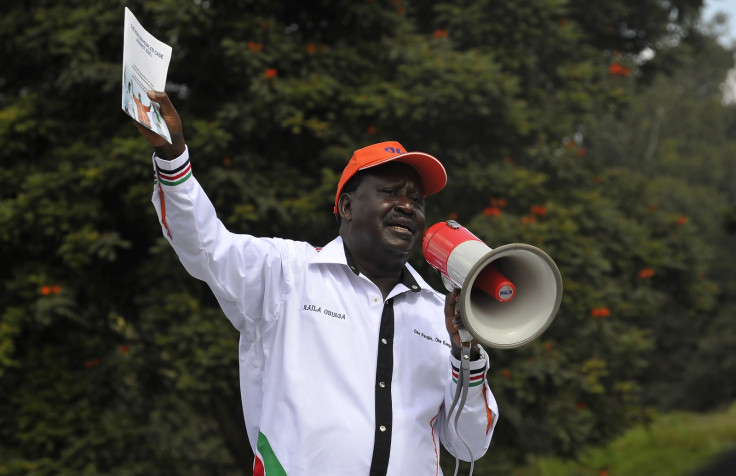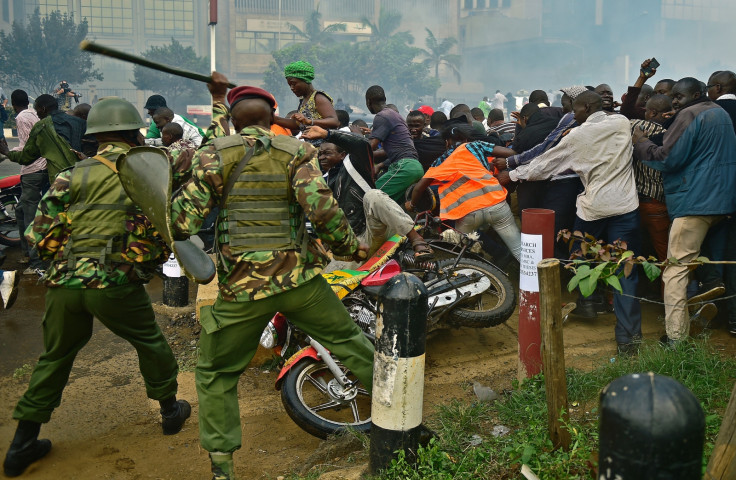Kenya: Opposition leader Raila Odinga warns of mass protests if August elections 'rigged'
Comments likely to unnerve Kenyans still reeling from 2007 post-election violence that killed some 1,200.

Kenyan opposition leader Raila Odinga has called on his supporters to mobilise and warned of mass protests across the country if the forthcoming General Election scheduled for 8 August 2017 is "rigged".
The foremost opposition presidential contender's comments are likely to unnerve Kenyans, who are still reeling from an explosion of post-election violence between December 2007 and February 2008. More than 1,200 people died and more than 600,000 displaced during this period marred by mass violence and ethnic killings.
The March 2013 election and aftermath was largely peaceful by contrast, after former Prime Minister Odinga, who leads the Orange Democratic Movement (ODM) opposition party, accepted the result after a court ruling.
"This country is not ready for another rigged election. Kenyans will not accept it," Odinga, whose His ODM party is a member party of the Coalition for Reforms and Democracy (CORD), said on 15 February.
President Uhuru Kenyatta and Odinga, his arch political rival, have both been on a massive voter registration drive across the East African nation, which officials say added 3 million people to nearly 16 million registered voters.
Odinga, however warned about a deeply flawed process, including duplicate voter registration – by which several people are registered to vote with the same identity card. The national election commission, which has accepted his criticisms, said it identified 78,000 duplicate registrations.
"We are confident we will have a credible and convincing register by 10 May to start verification," Independent Electoral and Boundaries Commission (IEBC) spokesman Andrew Limo, is quoted as saying by Reuters news agency. Limo said the commission was resolving the issue.

Seven new IEBC commissioners were sworn in earlier last month to replace a team forced to quit after CORD staged violent protests, accusing them of mismanagement and corruption. As he took the oath of office, new IEBC chief Wafula Chebukati, a lawyer, promised his team would deliver "free, fair and credible election".
Responding to Odinga's claims, the ruling Jubilee coalition said that Odinga was simply trying to smear the voting process early to lay the ground for challenging the results on the streets.
"The opposition is trying to create a narrative so eventually they have a way of rejecting the elections," government spokesman Munyori Buku said. "They never accept the result."
Kenya's 2007-2008 post-election violence
Following the 2007 disputed poll, civilians and police were reported to have fired live bullets, people were beaten or shot with arrows, roads were blocked by barricades and fires, police used of excessive force against protesters, and ethnic-based killings ensued, leaving some 1,200 people dead and hundreds of thousands displaced.
In 2014, rights groups estimated the post-election violence may have included 40,000 incidents of sexual and gender-based violence.
Kenyatta, then deputy prime minister and finance minister, was the first head of state to appear before the ICC after he was charged in January 2012 for crimes against humanity for his alleged role in organising and financing murder, displacement, and rape during the violence which followed the country's 2007-08 election.
In 2014, however, the court had to withdraw the charges for lack of evidence, after a large number of witnesses were allegedly intimidated into changing their testimony.
In 2016, the ICC also dismissed the case against Kenya's vice-president William Ruto and his co-accused journalist Joshua Arap Sang, who each faced three charges – murder, deportation or forcible transfer of population, and persecution.
© Copyright IBTimes 2025. All rights reserved.






















